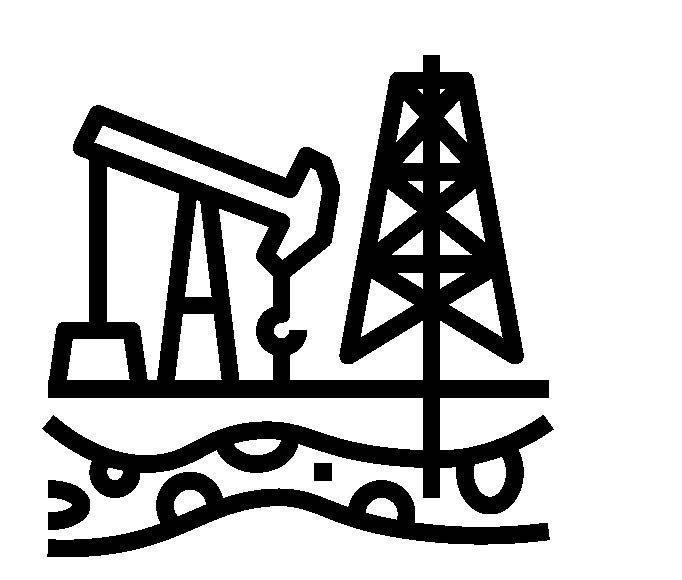Everyone wants a job that is personally satisfying and improves the world. Few career paths offer as many different ways to achieve both objectives as geoscience.
If you’re already enrolled in a geoscience program, this is hardly news to you. “The beauty of geoscience is that it is a multidimensional discipline that relies on many skill sets,” says Hehewutei “Cody” Amakali, a senior geoscientist with the ExxonMobil Exploration Company. “With one degree program, students can focus on field mapping, numerical modeling, physical model building, engineering, hazard identification, and environmental chemistry and biology. The possibilities are seemingly limitless with a geoscience curriculum.”
The career options are equally diverse. Even better, there is a growing need for more geoscientists. In fact, the American Geosciences Institute projects job growth of 10 percent between 2014 and 2024, fueled in part by widespread retirement among today’s geoscientists. Here you’ll find a sampling of some of today’s most promising geoscience careers.
Hydrology
 Water is the world’s most precious resource, which helps explain why careers in hydrology are so important. Put simply, hydrologists use their scientific skills to study water-related challenges, including the availability and quality of water for agriculture, industry, drinking, and other personal uses. Reliable access to water has driven the development of cities and towns throughout history — it’s no coincidence that human settlements have always been found along rivers. Today, a rising global population and the impacts of climate change are underscoring the importance of water access and quality around the globe. The need for hydrologists to study and devise solutions to this challenge will only increase.
Water is the world’s most precious resource, which helps explain why careers in hydrology are so important. Put simply, hydrologists use their scientific skills to study water-related challenges, including the availability and quality of water for agriculture, industry, drinking, and other personal uses. Reliable access to water has driven the development of cities and towns throughout history — it’s no coincidence that human settlements have always been found along rivers. Today, a rising global population and the impacts of climate change are underscoring the importance of water access and quality around the globe. The need for hydrologists to study and devise solutions to this challenge will only increase.
FIND YOUR SCHOOL
- University of California, Davis
- University of Arizona
- Oregon State University
- Texas A&M University
POTENTIAL EMPLOYERS
- U.S. Geological Survey
- USDA
- EPA
- Lawrence Livermore National Laboratory
SAMPLE CURRENT OPENINGS
- State of Arizona: Environmental scientist, drinking water
- State of Utah: Water resource engineer
- Department of the Interior: Hydrologic technician
Data Analysis & Visualization
 The term “big data” is not hyperbole. Last year IBM reported that the world creates 2.5 quintillion bytes of data every single day — 90 percent of the data that exists now has been generated over just the past two years. Granted, a good chunk of that is social media, but a lot of it could be used to help businesses, governments, and societies function more efficiently, and that requires the skills of a data analyst. “Analyzing and visualizing datasets is important whether you work in public relations or genomic coding projects for cancer research, from surveying seafloor anomalies to analyzing bird migration routes,” says ExxonMobil’s Amakali. “Having the ability to handle dynamic datasets with multiple sources, as geoscientists do, positions students to step into nearly any environment and be able to put the data in a context that is as useful as it is comprehensive.”
The term “big data” is not hyperbole. Last year IBM reported that the world creates 2.5 quintillion bytes of data every single day — 90 percent of the data that exists now has been generated over just the past two years. Granted, a good chunk of that is social media, but a lot of it could be used to help businesses, governments, and societies function more efficiently, and that requires the skills of a data analyst. “Analyzing and visualizing datasets is important whether you work in public relations or genomic coding projects for cancer research, from surveying seafloor anomalies to analyzing bird migration routes,” says ExxonMobil’s Amakali. “Having the ability to handle dynamic datasets with multiple sources, as geoscientists do, positions students to step into nearly any environment and be able to put the data in a context that is as useful as it is comprehensive.”
FIND YOUR SCHOOL
- Northeastern University
- Georgia Institute of Technology
- Worcester Polytechnic Institute
- California Polytechnic State University
POTENTIAL EMPLOYERS
- Verizon
- Washington State Health Care Authority
- United Airlines
- Dow Jones
SAMPLE CURRENT OPENINGS
- Boston Consulting Group: Team manager, data visualization
- Columbia University: Faculty role, data visualization
- 3M: Data visualization specialist
- Microsoft: Data visualization expert
Geologic Engineering
 If you’ve ever wondered how it’s possible to snake a road along a steep precipice, you’re a fan of geologic engineering. A professional hybrid, geologic engineers combine their knowledge of geology and engineering to ensure that buildings and other infrastructure are sited in locations that can adequately support them. Besides making engineering marvels possible, geologic engineers are instrumental to mining operations and environmental preservation. Geologic engineers help search for deposits of minerals and metals and plan for their extraction in ways that don’t harm the environment. The job prospects for geologic engineers are strong, with the Bureau of Labor Statistics (BLS) predicting 8 percent growth between 2016 and 2026.
If you’ve ever wondered how it’s possible to snake a road along a steep precipice, you’re a fan of geologic engineering. A professional hybrid, geologic engineers combine their knowledge of geology and engineering to ensure that buildings and other infrastructure are sited in locations that can adequately support them. Besides making engineering marvels possible, geologic engineers are instrumental to mining operations and environmental preservation. Geologic engineers help search for deposits of minerals and metals and plan for their extraction in ways that don’t harm the environment. The job prospects for geologic engineers are strong, with the Bureau of Labor Statistics (BLS) predicting 8 percent growth between 2016 and 2026.
FIND YOUR SCHOOL
- Colorado School of Mines
- Montana Tech of the University of Montana
- New Mexico State University
- Michigan Technological University
POTENTIAL EMPLOYERS
- Enviroscience Consultants
- Hydro-Environmental Technologies
- Kinder Morgan
- TechUSA
SAMPLE CURRENT OPENINGS
- Condor Earth: Staff geological engineer
- Golder Associates: Geological engineer
- WSP: Geological engineer II
- ASARCO: Geological engineer intern
Petroleum Engineering
 The energy landscape around the globe has changed dramatically. Although nations like Saudi Arabia and Russia have long been considered the dominant players in the production of petroleum and natural gas, the United States has been the world’s top producer of both for each of the past five years. In large part, the change has to do with the work of America’s petroleum engineers, who are developing the plans, equipment, and techniques (including fracking) to drill and operate wells. In some cases, those wells exist on dry land, though a significant number are located in the ocean. Though job prospects for petroleum engineers vary depending on the price of oil and gas, the BLS estimates that the sector will grow 15 percent between 2016 and 2026, a rate that far surpasses the average expected employment growth across the economy.
The energy landscape around the globe has changed dramatically. Although nations like Saudi Arabia and Russia have long been considered the dominant players in the production of petroleum and natural gas, the United States has been the world’s top producer of both for each of the past five years. In large part, the change has to do with the work of America’s petroleum engineers, who are developing the plans, equipment, and techniques (including fracking) to drill and operate wells. In some cases, those wells exist on dry land, though a significant number are located in the ocean. Though job prospects for petroleum engineers vary depending on the price of oil and gas, the BLS estimates that the sector will grow 15 percent between 2016 and 2026, a rate that far surpasses the average expected employment growth across the economy.
FIND YOUR SCHOOL
- Oklahoma State University
- Stanford University
- Pennsylvania State University
- University of Texas at Austin
POTENTIAL EMPLOYERS
- Citi
- Bureau of Land Management
- ARCO Group
- Occidental Petroleum
SAMPLE CURRENT OPENINGS
- BP: Petroleum engineer
- Department of the Interior: Supervisory petroleum engineer
- Schlumberger: Petrotechnical petroleum engineer
- U.S. Geological Survey: Petroleum engineer
Geochemistry
 Petroleum engineers can’t do their work without the help of geochemists. With their understanding of the chemical makeup of rocks and minerals and their interaction with soil and water, geochemists can identify the best locations to drill for oil and gas. But an in-depth understanding of the composition of rocks has plenty of applications outside the oil and gas industry. Geochemists can help governments and companies find the optimal place to dispose of hazardous waste and help mining companies extract resources with minimum environmental impact. As the Earth’s population continues to grow, the need for energy and other natural resources will expand. Extracting those resources in a manner that doesn’t harm vital ecosystems will require geochemists.
Petroleum engineers can’t do their work without the help of geochemists. With their understanding of the chemical makeup of rocks and minerals and their interaction with soil and water, geochemists can identify the best locations to drill for oil and gas. But an in-depth understanding of the composition of rocks has plenty of applications outside the oil and gas industry. Geochemists can help governments and companies find the optimal place to dispose of hazardous waste and help mining companies extract resources with minimum environmental impact. As the Earth’s population continues to grow, the need for energy and other natural resources will expand. Extracting those resources in a manner that doesn’t harm vital ecosystems will require geochemists.
FIND YOUR SCHOOL
- Brown University
- California Institute of Technology
- New Mexico Institute of Mining and Technology
- Washington University in St. Louis
POTENTIAL EMPLOYERS
- Lawrence Berkeley National Laboratory
- Knight Piésold Consulting
- University of Illinois
- Arcadis
SAMPLE CURRENT OPENINGS
- Oak Ridge National Laboratory: Neutron scattering geochemist
- Golder Associates: Geochemist
- Barr Engineering: Geochemist, senior level
- University of Minnesota: Aqueous geochemist
Environmental Engineering
 Many of the activities that make our own lives more comfortable can have a negative impact on the ecosystems that sustain us. Environmental engineers use their skills to prevent or mitigate potential environmental problems. From responsibly disposing of waste to improving air and water quality and finding ways to bolster the resilience of communities in the face of climate change, environmental engineers play a key role in improving overall quality of life. These professionals must be skilled at everything from the field studies necessary to diagnose problems to the data analysis needed to devise or enforce fixes. An increasing global population coupled with a higher demand for natural resources will keep the demand for environmental engineers high. In fact, the American Geosciences Institute pegs environmental engineer as one of its top future careers.
Many of the activities that make our own lives more comfortable can have a negative impact on the ecosystems that sustain us. Environmental engineers use their skills to prevent or mitigate potential environmental problems. From responsibly disposing of waste to improving air and water quality and finding ways to bolster the resilience of communities in the face of climate change, environmental engineers play a key role in improving overall quality of life. These professionals must be skilled at everything from the field studies necessary to diagnose problems to the data analysis needed to devise or enforce fixes. An increasing global population coupled with a higher demand for natural resources will keep the demand for environmental engineers high. In fact, the American Geosciences Institute pegs environmental engineer as one of its top future careers.
FIND YOUR SCHOOL
- Duke University
- Kent State University
- North Carolina State University
- SUNY College of Environmental Science and Forestry
POTENTIAL EMPLOYERS
- U.S. Army
- Alcoa
- MIT
- Loureiro Engineering Associates
SAMPLE CURRENT OPENINGS
- BMW North America: Environmental engineering intern
- Amazon.com: Regional environmental engineer
- Department of the Air Force: Environmental engineer
- New England Interstate Water Pollution Control Commission: Program manager, environmental engineer
Geospatial Information Systems
 The list of potential fields that experts in geospatial information systems can enter is eye-popping. Both the private sector and governments need professionals adept in machine learning, geographic information systems (GIS), computer-aided design (CAD) renderings, and 3-D animation. For geoscience graduates, the bundle of skills under the umbrella of geospatial information systems opens up the possibility of guiding urban planning projects, supporting forest management, assisting soil analysis for agriculture, and developing plans to remediate the impact of floods. “Geospatial information is a core product used in geoscience careers,” says Amakali. It also helps geologists do their work better and more effectively communicate their findings. “Geologists analyze the Earth’s surface and how it has evolved through time, and we use geospatial information (maps) to communicate our interpretation of events through time or how we predict things will occur in the future,” she adds. “It’s a little bit of art supported by a data science and mathematical background.”
The list of potential fields that experts in geospatial information systems can enter is eye-popping. Both the private sector and governments need professionals adept in machine learning, geographic information systems (GIS), computer-aided design (CAD) renderings, and 3-D animation. For geoscience graduates, the bundle of skills under the umbrella of geospatial information systems opens up the possibility of guiding urban planning projects, supporting forest management, assisting soil analysis for agriculture, and developing plans to remediate the impact of floods. “Geospatial information is a core product used in geoscience careers,” says Amakali. It also helps geologists do their work better and more effectively communicate their findings. “Geologists analyze the Earth’s surface and how it has evolved through time, and we use geospatial information (maps) to communicate our interpretation of events through time or how we predict things will occur in the future,” she adds. “It’s a little bit of art supported by a data science and mathematical background.”
FIND YOUR SCHOOL
- Johns Hopkins University
- Southern New Hampshire University
- Boston University
- Bowling Green State University
POTENTIAL EMPLOYERS
- Leidos
- Pennsylvania State University
- Slingshot Aerospace
- SpecTIR
SAMPLE CURRENT OPENINGS
- Shine Systems and Technologies: Junior geospatial information systems analyst
- GAE Systems: Geospatial analyst
- CGI: Geospatial system analyst
- Kentucky National Guard: Geospatial intelligence imagery analyst
Environmental Science
 Science Often the work of environmental engineers is preceded by research conducted by environmental scientists, who collect and analyze data about the health of ecosystems and devise ways to reduce the negative effects of pollution. It’s a job that is expected to grow faster than the average occupation over the next eight years, and it’s one where people can work in a variety of sectors. It’s also a field students are keen to enter. “I’ve noticed over the last two years there is a growing number of students interested in working as consultants in the private sector,” says Tahlia Bear, diversity and career officer at the Geological Society of America. “Employment as environmental scientists crosses sectors into private industry, government, and nonprofit work.”
Science Often the work of environmental engineers is preceded by research conducted by environmental scientists, who collect and analyze data about the health of ecosystems and devise ways to reduce the negative effects of pollution. It’s a job that is expected to grow faster than the average occupation over the next eight years, and it’s one where people can work in a variety of sectors. It’s also a field students are keen to enter. “I’ve noticed over the last two years there is a growing number of students interested in working as consultants in the private sector,” says Tahlia Bear, diversity and career officer at the Geological Society of America. “Employment as environmental scientists crosses sectors into private industry, government, and nonprofit work.”
FIND YOUR SCHOOL
- McGill University
- American University
- Auburn University
- Harvard University
POTENTIAL EMPLOYERS
- Bechtel
- State of Nevada
- Kelly Scientific Resources
- Geotek Engineering and Testinges
SAMPLE CURRENT OPENINGS
- State of Arizona: Environmental scientist
- Stanley Consultants: Environmental scientist
- State of Louisiana: Senior environmental scientist
- American Water Works Association: Environmental scientist
Natural Resource Management
 Using both scientific and communication skills, natural resource managers generally work to promote conservation of land, water, and animals while balancing the demands of industries and people who rely on those resources. This complex job requires scientific knowledge to grasp what’s most important to the long-term health of ecosystems as well as the ability to collaborate and work with communities, government, and the private sector — all of which have an interest in how resources are used. Many natural resource managers work for the federal, state, or local government or for private industry, including timber companies and the oil and gas industry.
Using both scientific and communication skills, natural resource managers generally work to promote conservation of land, water, and animals while balancing the demands of industries and people who rely on those resources. This complex job requires scientific knowledge to grasp what’s most important to the long-term health of ecosystems as well as the ability to collaborate and work with communities, government, and the private sector — all of which have an interest in how resources are used. Many natural resource managers work for the federal, state, or local government or for private industry, including timber companies and the oil and gas industry.
FIND YOUR SCHOOL
- Queen’s University
- Carnegie Mellon University
- New Mexico Highlands University
- University of Hawaii at Manoa
POTENTIAL EMPLOYERS
- USDA
- U.S. Army Corps of Engineers
- U.S. Forest Service
- MobilizeGreen
SAMPLE CURRENT OPENINGS
- Department of the Army: Natural resources manager
- State of Washington: Natural resources manager
- KBR: Natural resources manager
- SWCA Environmental Consultants: Natural resources project manager
Biogeography and Ethnogeology

You won’t find biogeography or ethnogeology on any hot jobs lists. But ExxonMobil’s Amakali thinks that very well may change. Historically, biogeography has been a study of how the distribution of organisms in an environment impacted global ecology changes. More recently, the field has evolved to become a study of the mix of environmental and human influences on species development — how a species evolves, where it lives, and whether it flourishes or goes extinct. “Research institutions are especially focused on understanding why or how biodiversity rises or declines as well as what special adaptations individual species might have that could allow for insights for medical research,” she says. “These same researchers help evaluate the impact urban encroachment has on a specific species, or whether certain environments will suffer from development or mismanagement.” As the world’s population continues to grow, vital resource conservation and management will depend on biogeographers.
A key aspect of conservation is the understanding local people have of the environments they inhabit. Ethnogeology examines how a culture’s beliefs, diets, art, and community structures are a reflection of their surroundings. Put another way, this role injects a hyperlocal perspective into a community’s understanding of the environment we all depend on. “This discipline actually seeks to do the opposite of traditional anthropological studies and bring traditional knowledge keepers in as collaborators, rather than being the study subjects themselves,” says Amakali. “One of the things that makes this an exciting career opportunity is that it potentially bridges a gap in geoscience education by making geological sciences more accessible and meaningful to underrepresented groups, and by increasing public literacy on geologic subjects. The result of reaching more people in a way that is more meaningful and comprehensible to them is that it facilitates an informed conversation around the complex issues that geologists often face.”
FIND YOUR SCHOOL
- Arizona State University
- University of Minnesota
- Central Washington University
- University of Southern California
POTENTIAL EMPLOYERS
- The Nature Conservancy
- University of Oregon
- Arizona State University
- Wheaton College
SAMPLE CURRENT OPENINGS
- University of Tennessee: Doctoral research associate
- Montana State University: Earth sciences faculty
- University of Maine: Assistant professor
- Smith College: Education director, botanic gardens













